- Home
- Tim Lebbon
White and Other Tales of Ruin
White and Other Tales of Ruin Read online
White and Other Tales of Ruin
by
Tim Lebbon
Illustrated by Caniglia
A digital edition published by
Necon Ebooks
This Edition Copyright 2011 Tim Lebbon
Cover & Illustrations Copyright 2011 Caniglia
Introduction Copyright 2011 by Jack Ketchum
This ebook is licensed for your personal enjoyment only. This ebook may not be re-sold or given away to other people. If you would like to share this book with another person, please purchase an additional copy for each person. If you’re reading this book and did not purchase it, or it was not purchased for your use only, then please purchase your own copy. Thank you for respecting the hard work of this author.
* * *
For Jason, Jeremy & Ben, who are not bleak.
* * *
Table of Contents
Introduction by Jack Ketchum
White
From Bad Flesh
Hell
The First Law
The Origin of Truth
Mannequin Man and the Plastic Bitch
Story Notes
* * *
Introduction by Jack Ketchum
You like a good opening, don’t you?
Sure you do.
Me, I insist on it. I do a first-paragraph test. You don’t pass it, you’re a goner. I open the book or the story and read the first paragraph and if it works for me, if it engages me, I go on — if it doesn’t, no purchase, or if I already own the thing it gets shelved forever. To do a reversal on Hippocrates, Art may be long, but Life is short. And of books, there are aplenty.
An author doesn’t necessarily have to send me racing breathless out of the gate. Not necessary. A leisurely pace is fine too. Though if a writer and I are going for a little stroll together, it had better be a pretty nice day.
So how about this for an opening paragraph? It’s from Tim Lebbon’s “The Origin of Truth.”
They were stuck in a traffic jam. There was nowhere they could go. They couldn’t help but see the melting man.
Melting man? Okay, Tim, you got me.
Or this, from “White” — which won the British Fantasy Award, by the way.
We found the first body two days before Christmas.
Yeah, I know, I know — that’s an opening line. But sometimes the opening line is the opening paragraph, right? And if it’s a good one it’ll do just fine to set the writer and me along on our mutual paths together. Of course, if the writer pulls that particular gambit, he’s got to have a decent follow-up. Like ...
Charley had been out gathering sticks to dry for tinder. She had worked her way through the wild garden and down toward the cliffs, scooping snow from beneath and around bushes and bagging whatever dead twigs she found there. There were no signs, she said. No disturbances in the virgin surface of the snow; no tracks; no warning. Nothing to prepare her for the scene of bloody devastation she stumbled across.
I don’t know about you but that sets my foot a-tappin’ too.
And a final one, on a quieter note. To seduce you into thinking you’re taking one of those little strolls I mentioned.
Della is the only person I listen to. I hear the views of others, weigh the significance of their opinions; but Della is wise, Della is good. Sometimes, I think she’s one step removed from everyone else.
I’m in again. Della is wise, Della is good. I want to know who Della is. And dammit, I’m gonna find out.
So why’s a good opening so important?
Because paying attention to the initial steps, figuring the texture, getting the rhythms right, deciding if you want something simple or complex, how much you want to reveal or merely hint at, is the mark of a real writer — the first sign you as reader get that maybe, just maybe, this time you’re in luck, you’ve got the honest-to-god real thing and you’re not in the hands of some hack.
Lebbon clues you in right away.
Fear not, reader, I have something to offer you.
Part of what he’s offering is fear. But that’s beside the point.
A few years back a bunch of us old fart horror writers were maundering over our beers and scotches at some bar at some Con or other, wringing our hands and asking ourselves, where the hell were all the kids? Where were the new crop of horror writers? The new blood, the ones who’d take up the mantle? Where were the goddamn kids? We were kids once. We could remember that, some of us.
But we were in our forties, fifties now. And from what we could see, with a few exceptions we could name thank god, most of the younger writers in their twenties and even thirties just weren’t doing their homework. The stuff we were seeing was sloppy, underbaked. Either derivative as hell or — worse — wholly ignorant of our own particular canon or maybe of any canon at all, of what had come before. They were either reading a handful of people and aping them shamelessly or else they seemed to be barely reading period, and thought that a vampire who doesn’t burn up under direct sunlight was the bees knees in originality. They seemed to lack the real ambition of any true novelist or storyteller — to be doing something fresh and honest, human and exciting. A lot of what we were seeing was just plain phony,
Not to mention heartless. Not to mention without meaning. Real characters, real folks you could care about in real difficulty were getting hard to come by.
As I say, we did a lot of hand-wringing and gnashing of teeth that evening. And yes, there were a few people we could point to who were doing really interesting stuff on a consistent basis but damn, they were few, and most of them were already in their thirties. Proto-Old Farts like us.
Tim was all of about twenty-six, twenty-seven at the time.
I didn’t even know he existed. Wish I had.
It would have gone a long way toward setting our minds at ease.
Because he was out there — while we were sitting there drinking — doing what you’re supposed to do. Plugging along, doing his goddamn homework, experimenting, feeling, putting that feeling down on paper. Even getting published now and then.
Working at getting it right.
I didn’t exactly dive right in to Tim’s stuff. I tiptoed first. Then I dove.
Tim and I first met at World Horror in Seattle. He was good company. Smart, funny and — well, you know those Brits, they can be so charming you forget all about King George and that they once owned half the world. I wasn’t familiar with his writing, though. Then at some point he asked me if I’d like a copy of his short story collection, As the Sun Goes Down. I have more unread books in my closet than Burger Hut has burger huts but I make it a point never to turn one down. Especially if it’s written by somebody I already like.
But liking the writer doesn’t necessarily mean you’ll like the work and to be honest, often I’m disappointed. That damn unforgiving first paragraph rears its ugly head or else there’s just not enough there there, if you know what I mean. So as usual, I approached Tim’s stuff with hope but also with some trepidation. I’ll just read a story, I thought. Just one. Check it out.
I’m in the middle of reading Gotham anyway. Only about a thousand pages to go.
The next day and only a third of the way into As the Sun Goes Down, Gotham was in a holding pattern over Kennedy and I was asking people, have you heard of this guy Lebbon?
And by the time I finished it, I was writing him a fan letter,
I told him the story I’ve just told you about us writers sitting around complaining and then said, in part, these stories are amazing. It’s utterly accomplished stuff. I’d pay the cover price for the novella alone or “Endangered Species in C Minor” for that matter ... you are not just a hell of a storyteller, which you are. And it’s n
ot just that your prose is lucid and clean and sometimes downright beautiful. What you do so well that so many others fail to do ... is to make me care about your characters — even the ones who are not so very nice. No plot-over-people bullshit here. You have the true gift of compassion, Tim, and it shines through everywhere ... you write not just from the mind but from the heart and that’s sort of rare in our subspecies of writer, y’know? Especially one of your age ... congratulations on this book, and thanks very much for handing it to me. I know I’ll be visiting your good deep well again before too long ...
Which obviously turned out to be true, since here I am.
But I meant every word of it. Sun ... blew me away. And what I said is true of the volume you hold in your hands as well. These stories are meant to chill you, to hurt you, and they will. But they’ll do so for the right reasons. They’ll do so because of the people. The plots here are all to one degree or another apocalyptic. In each one all hell’s broken loose, something terrible has happened and something in the world is winding down.
But that doesn’t mean the human spirit’s winding down. Far from it. That’s where the stories get their teeth from and why they hurt.
Some hurt right from the opening.
A really good writer pays attention to his openings because he knows he needs to engage you. Then once engaged, he wants a wedding. It’s not the till-death-do-us-part variety exactly. The wedding consists of your mind and his in fine and special intimacy for the duration of the story, long or short. Like any good bridegroom, in exchange for this intimacy he promises certain things. He will not insult your intelligence. He will not betray you with cheap tricks just to force you to follow in his direction. And most importantly, he will honor your heart.
Tim keeps his promises.
And he’s young. He’s only just begun.
* * *
* * *
White
one: the colour of blood
We found the first body two days before Christmas.
Charley had been out gathering sticks to dry for tinder. She had worked her way through the wild garden and down toward the cliffs, scooping snow from beneath and around bushes and bagging whatever dead twigs she found there. There were no signs, she said. No disturbances in the virgin surface of the snow; no tracks; no warning. Nothing to prepare her for the scene of bloody devastation she stumbled across.
She had rounded a big boulder and seen the red splash in the snow which was all that remained of a human being. The shock froze her comprehension. The reality of the scene struggled to imprint itself on her mind. Then, slowly, what she was looking at finally registered.
She ran back screaming. She’d only recognised her boyfriend by what was left of his shoes.
We were in the dining room trying to make sense of the last few weeks when Charley came bursting in. We spent a lot of time doing that: talking together in the big living rooms of the manor; in pairs, crying and sharing warmth; or alone, staring into darkening skies and struggling to discern a meaning in the infinite. I was one of those more usually alone. I’d been an only child and contrary to popular belief, my upbringing had been a nightmare. I always thought my parents blamed me for the fact that they could not have any more children, and instead of enjoying and reveling in my own childhood, I spent those years watching my mother and father mourn the ghosts of unborn offspring. It would have been funny if it were not so sad.
Charley opened the door by falling into it. She slumped to the floor, hair plastered across her forehead, her eyes two bright sparks peering between the knotted strands. Caked snow fell from her boots and speckled the timber floor, dirtied into slush. The first thing I noticed was its pinkish tinge.
The second thing I saw was the blood covering Charley’s hands.
“Charley!” Hayden jumped to his feet and almost caught the frantic woman before she hit the deck. He went down with her, sprawling in a sudden puddle of dirt and tears. He saw the blood then and backed away automatically. “Charley?”
“Get some towels,” Ellie said, always the pragmatist, “and a fucking gun.”
I’d seen people screaming — all my life I’d never forgotten Jayne’s final hours — but I had never seen someone actually beyond the point of screaming. Charley gasped and clawed at her throat, trying to open it up and let out the pain and the shock trapped within. It was not exertion that had stolen her breath; it was whatever she had seen.
She told us what that was.
I went with Ellie and Brand. Ellie had a shotgun cradled in the crook of her arm, a bobble hat hiding her severely short hair, her face all hard. There was no room in her life for compliments, but right now she was the one person in the manor I’d choose to be with. She’d been all for trying to make it out alone on foot; I was so glad that she eventually decided to stay.
Brand muttered all the way. “Oh fuck, oh shit, what are we doing coming out here? Like those crazy girls in slasher movies, you know? Always chasing the bad guys instead of running from them? Asking to get their throats cut? Oh man …”
In many ways I agreed with him. According to Charley there was little left of Boris to recover, but she could have been wrong. We owed it to him to find out. However harsh the conditions, whatever the likelihood of his murderer — animal or human — still being out here, we could not leave Boris lying dead in the snow. Apply whatever levels of civilisation, foolish custom or superiority complex you like, it just wasn’t done.
Ellie led the way across the manor’s front garden and out onto the coastal road. The whole landscape was hidden beneath snow, like old sheet-covered furniture awaiting the homecoming of long-gone owners. I wondered who would ever make use of this land again — who would be left to bother when the snow did finally melt — but that train of thought led only to depression.
We crossed the flat area of the road, following Charley’s earlier footprints in the deep snow; even and distinct on the way out, chaotic on the return journey. As if she’d had something following her.
She had. We all saw what had been chasing her when we slid and clambered down toward the cliffs, veering behind the big rock that signified the beginning of the coastal path. The sight of Boris opened up and spread across the snow had pursued her all the way, and was probably still snapping at her heels now. The smell of his insides slowly cooling under an indifferent sky. The sound of his frozen blood crackling under foot.
Ellie hefted the gun, holding it waist-high, ready to fire in an instant. Her breath condensed in the air before her, coming slightly faster than moments before. She glanced at the torn-up Boris, then surveyed our surroundings, looking for whoever had done this. East and west along the coast, down toward the cliff edge, up to the lip of rock above us, east and west again; Ellie never looked back down at Boris.
I did. I couldn’t keep my eyes off what was left of him. It looked as though something big and powerful had held him up to the rock, scraped and twisted him there for a while, and then calmly taken him apart across the snow-covered path. Spray patterns of blood stood out brighter than their surroundings. Every speck was visible and there were many specks, thousands of them spread across a ten metre area. I tried to find a recognisable part of him, but all that was even vaguely identifiable as human was a hand, stuck to the rock in a mess of frosty blood, fingers curled in like the legs of a dead spider. The wrist was tattered, the bone splintered. It had been snapped, not cut.
Brand pointed out a shoe on its side in the snow. “Fuck, Charley was right. Just his shoes left. Miserable bastard always wore the same shoes.”
I’d already seen the shoe. It was still mostly full. Boris had not been a miserable bastard. He was introspective, thoughtful, sensitive, sincere, qualities which Brand would never recognise as anything other than sourness. Brand was as thick as shit and twice as unpleasant.
The silence seemed to press in around me. Silence, and cold, and a raw smell of meat, and the sea chanting from below. I was surrounded by everything.
“Let�
�s get back,” I said. Ellie glanced at me and nodded.
“But what about —” Brand started, but Ellie cut in without even looking at him.
“You want to make bloody snowballs, go ahead. There’s not much to take back. We’ll maybe come again later. Maybe.”
“What did this?” I said, feeling reality start to shimmy past the shock I’d been gripped by for the last couple of minutes. “Just what the hell?”
Ellie backed up to me and glanced at the rock, then both ways along the path. “I don’t want to find out just yet,” she said.
Later, alone in my room, I would think about exactly what Ellie had meant. I don’t want to find out just yet, she had said, implying that the perpetrator of Boris’s demise would be revealed to us soon. I’d hardly known Boris, quiet guy that he was, and his fate was just another line in the strange composition of death that had overcome the whole country during the last few weeks.
Charley and I were here in the employment of the Department of the Environment. Our brief was to keep a check on the radiation levels in the Atlantic Drift, since things had gone to shit in South America and the dirty reactors began to melt down in Brazil. It was a bad job with hardly any pay, but it gave us somewhere to live. The others had tagged along for differing reasons; friends and lovers of friends, all taking the opportunity to get away from things for a while and chill out in the wilds of Cornwall.
But then things went to shit here as well. On TV, minutes before it had ceased broadcasting for good, someone called it the ruin.

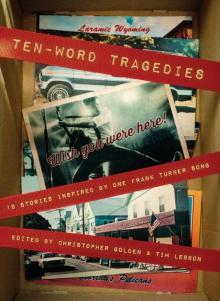 Ten-Word Tragedies
Ten-Word Tragedies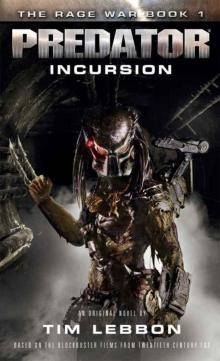 Predator: Incursion
Predator: Incursion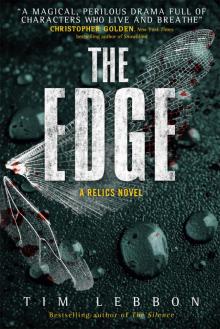 Relics--The Edge
Relics--The Edge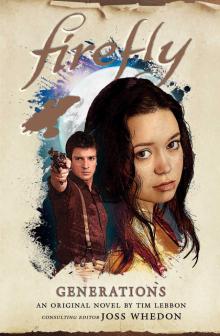 Firefly
Firefly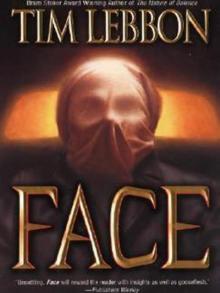 Face
Face Generations
Generations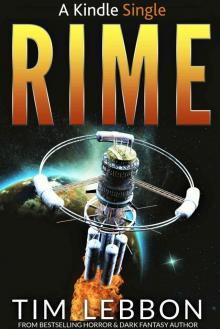 RIME (Kindle Single)
RIME (Kindle Single) Fallen
Fallen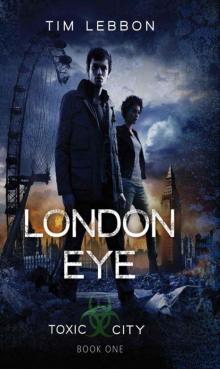 London Eye tc-1
London Eye tc-1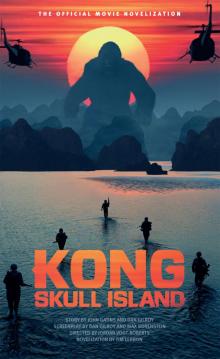 Kong: Skull Island
Kong: Skull Island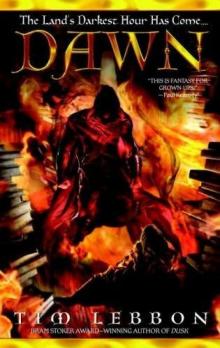 Dawn n-2
Dawn n-2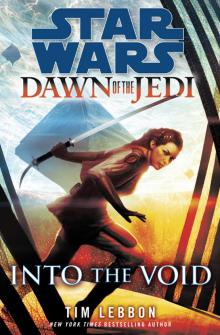 Into the Void: Star Wars (Dawn of the Jedi)
Into the Void: Star Wars (Dawn of the Jedi)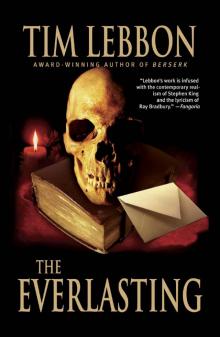 The Everlasting
The Everlasting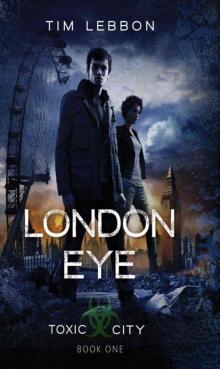 London Eye: 1 (Toxic City)
London Eye: 1 (Toxic City)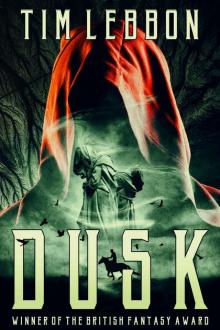 Dusk: a dark fantasy novel (A Noreela novel)
Dusk: a dark fantasy novel (A Noreela novel)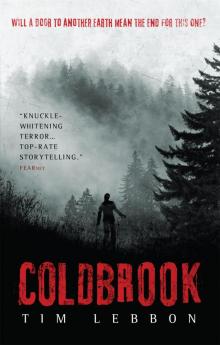 Coldbrook
Coldbrook Alien
Alien Dusk
Dusk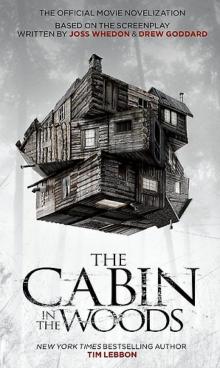 The Cabin in the Woods
The Cabin in the Woods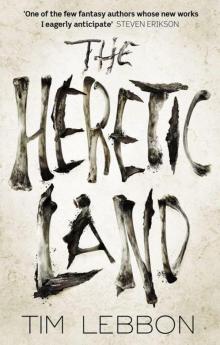 The Heretic Land
The Heretic Land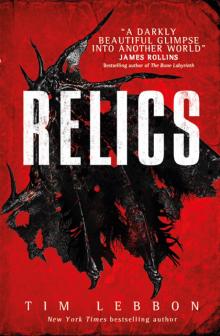 Relics
Relics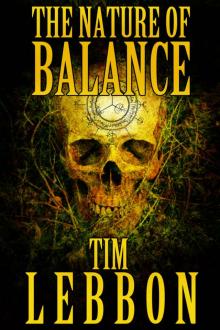 The Nature of Balance
The Nature of Balance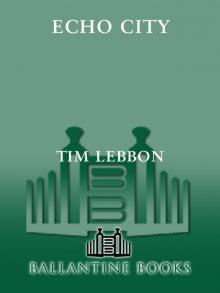 Echo City
Echo City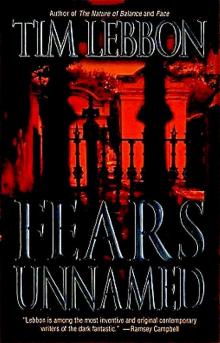 Tim Lebbon - Fears Unnamed
Tim Lebbon - Fears Unnamed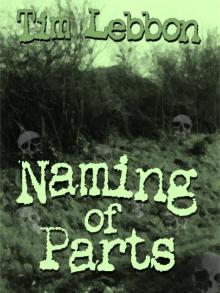 Naming of Parts
Naming of Parts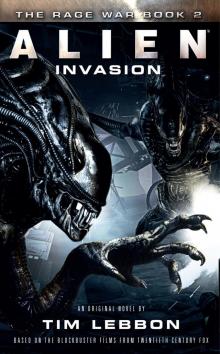 Alien--Invasion
Alien--Invasion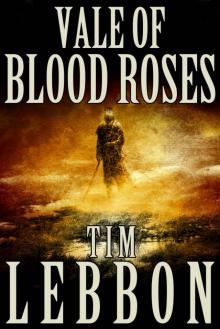 Vale of Blood Roses
Vale of Blood Roses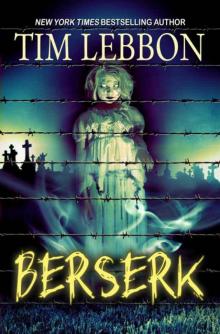 Berserk
Berserk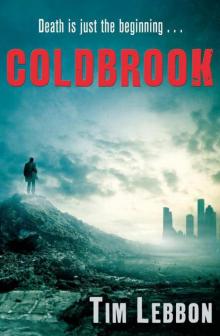 Coldbrook (Hammer)
Coldbrook (Hammer)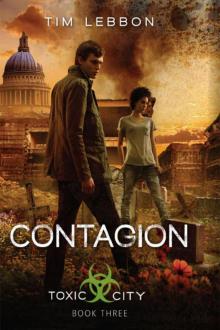 Contagion tc-3
Contagion tc-3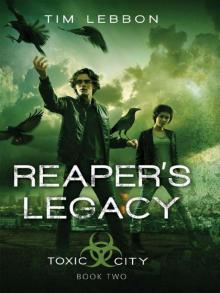 Reaper's Legacy: Book Two (Toxic City)
Reaper's Legacy: Book Two (Toxic City)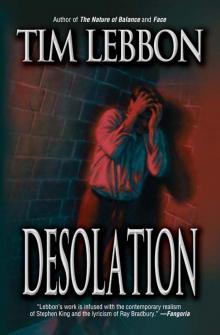 Desolation
Desolation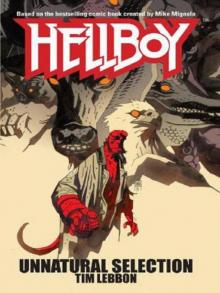 Unnatural Selection
Unnatural Selection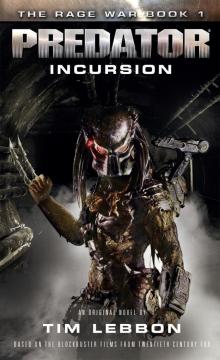 Predator - Incursion
Predator - Incursion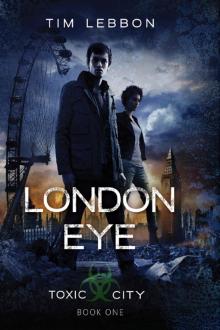 London Eye
London Eye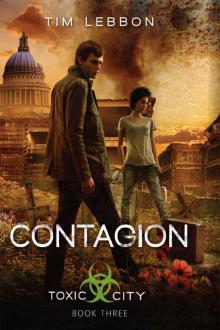 Contagion (Toxic City Book Three)
Contagion (Toxic City Book Three) The Silence
The Silence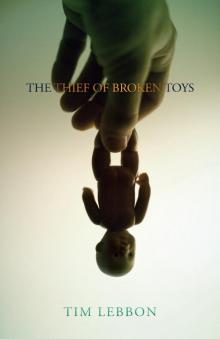 The Thief of Broken Toys
The Thief of Broken Toys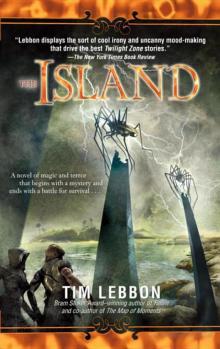 Tales of Noreela 04: The Island
Tales of Noreela 04: The Island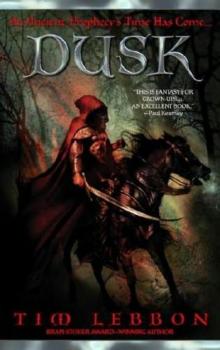 Dusk n-1
Dusk n-1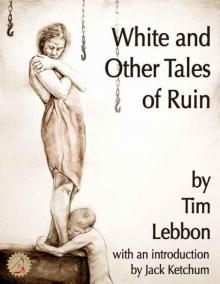 White and Other Tales of Ruin
White and Other Tales of Ruin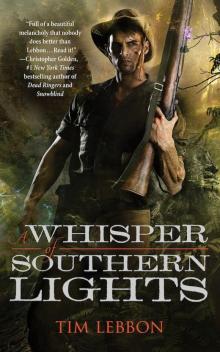 A Whisper of Southern Lights
A Whisper of Southern Lights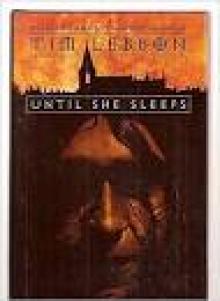 Until She Sleeps
Until She Sleeps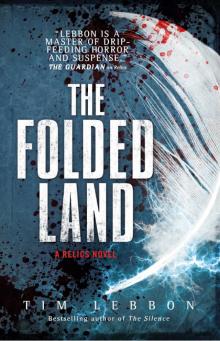 Relics--The Folded Land
Relics--The Folded Land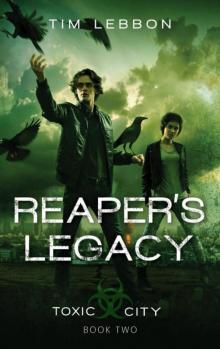 Reaper's Legacy tc-2
Reaper's Legacy tc-2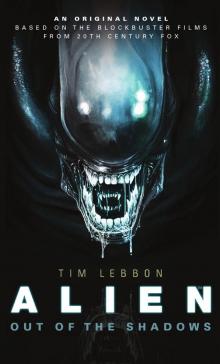 Alien: Out of the Shadows
Alien: Out of the Shadows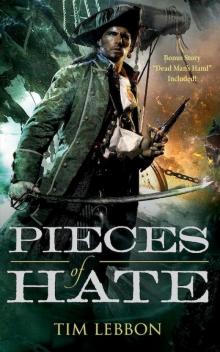 Pieces of Hate
Pieces of Hate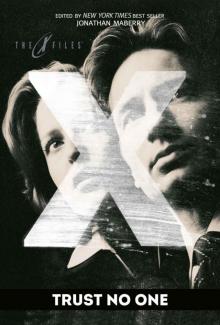 X-Files: Trust No One
X-Files: Trust No One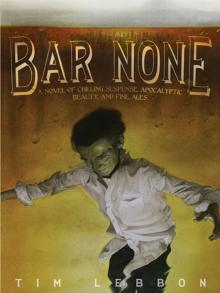 Bar None
Bar None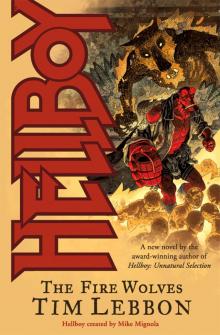 The Fire Wolves
The Fire Wolves